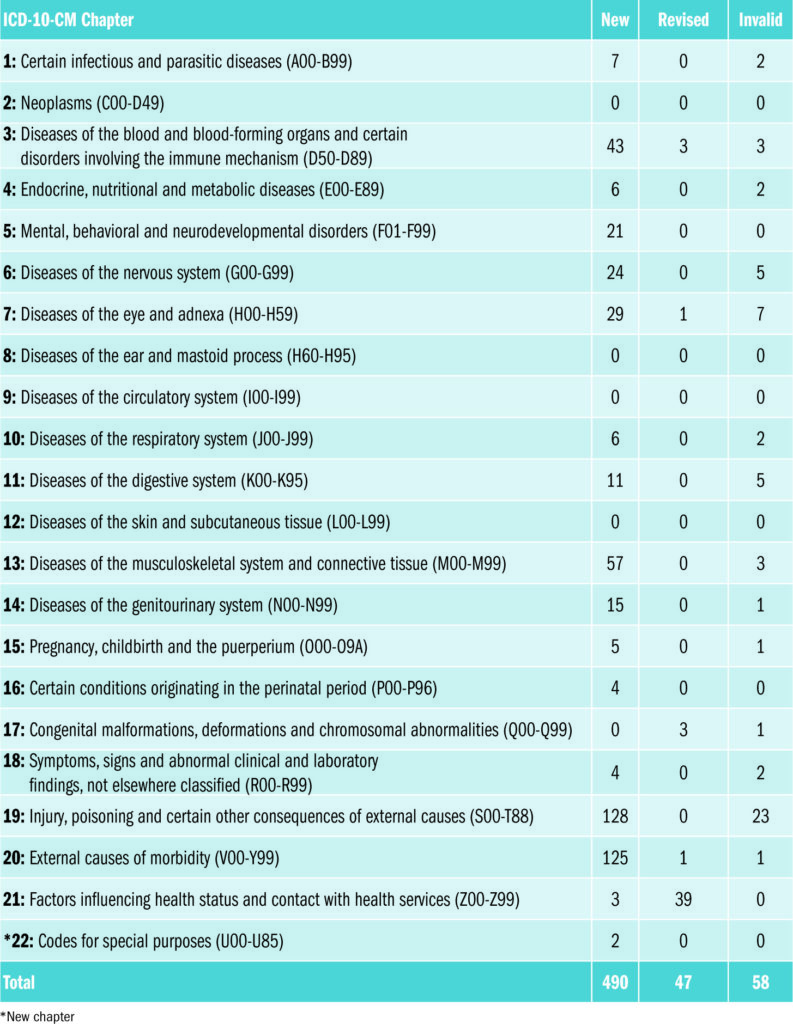Below is an overview of the final rule as well as changes in various categories that may be important to you. There are 490 new, 47 revised, and 58 deleted ICD-10-CM diagnosis codes finalized for fiscal year 2021 taking effect October 1, 2020.

The final rule includes hundreds of new ICD-10-CM codes:
128 additions to Chapter 19: Injury, poisoning and certain other consequences of external causes for adverse effects and poisoning by fentanyl and tramadol as well as other synthetic narcotics.
125 additions to Chapter 20: External causes of morbidity, including more specific codes for collisions involving electric scooters and other non-motor vehicle accidents.
57 musculoskeletal codes, including several in category M24.-(other specific joint derangements) for other articular cartilage disorders, disorders of ligament, pathological dislocation, recurrent dislocation, contracture, and ankyloses.
21 codes to describe withdrawal from substances including alcohol, cocaine, and opioids.
18 codes for sickle cell anemia. New codes such as D57.213 (sickle-cell/Hb-C disease with cerebral vascular involvement) and D57.431 (sickle-cell thalassemia beta zero with acute chest syndrome) specify complications related to the condition.
Three codes to capture stage 3 chronic kidney disease (CKD) in two new sub-stages.
New Chapter 22 Codes for Special Purposes includes two new codes this year: U07.0 (vaping-related disorders) and U07.1 (COVID-19).
Changes can be found in the following categories:
New
D57 – sickle-cell disorders
D89 – other disorders involving the immune mechanism – not elsewhere classified
F10 – alcohol abuse and use with withdrawal
F19 – other psychoactive substance related disorders
H18 – other disorders of cornea
M05 – rheumatoid arthritis with rheumatoid factor
M06 – other rheumatoid arthritis
M08 – juvenile arthritis
M19 – other and unspecified osteoarthritis
M92 – juvenile osteochondrosis
S20 – superficial injury of thorax
T40 – poisoning by, adverse effect of, and under-dosing of narcotics and psychodysleptics (hallucinogens)
V00-V06 – electric scooter and other micro-mobility pedestrian conveyance injuries
Revised
Z68 – body mass index (BMI)
Z88 – allergy status codes
Deleted
T40 – poisoning, under-dosing, and adverse effects of other synthetic narcotics
Q51.20 – other doubling of the uterus, unspecified
In addition, CMS proposed new guidelines for Evaluation and Management CPT codes, effective January 1st, 2021. These changes apply to new and established office or other outpatient visits (99201-99215).
Code 99201 will be deleted.
History and exam will not be used in determining which visit code is supported.
Office level will be determined by time or medical decision making.
New definitions within MDM are given with slight changes to how MDM is calculated.
Visits will have assigned time ranges, defined as total spent on that date of service, including non-face-to-face work.
Does this seem like a lot to tackle in the midst of the pandemic? Dean Dorton offers comprehensive coding chart audits and provider documentation education to aid in compliance. For more information, contact Brandy Montgomery at 502-566-1037 or bmontgomery@ddafhealthcare.com.




